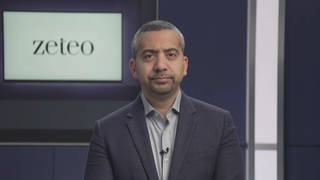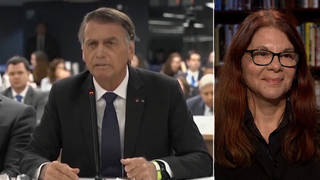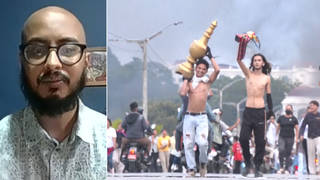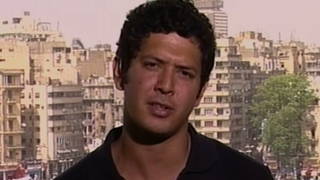
Topics
Guests
- Sharif Abdel Kouddousindependent journalist and Democracy Now! correspondent based in Cairo, Egypt.
- Hany MassoudDemocracy Now! video producer.
Voters are heading to the polls for the second day in Egypt’s first competitive presidential election following the ouster of Hosni Mubarak 15 months ago. The first day of voting saw numerous reports of minor violations, but was largely hailed as free of fraud and violence. Ahmed Shafik, Mubarak’s last prime minister and now a leading candidate, was swarmed by protesters outside his polling station who hurled shoes and debris at him. Democracy Now! correspondent Sharif Abdel Kouddous and videographer Hany Massoud spent the day traveling to polling stations around Cairo speaking to voters about their choices for president and their concerns in the election. [includes rush transcript]
Transcript
JUAN GONZÁLEZ: We end today’s show in Egypt, where voters are heading to the polls for the second day in the country’s first competitive presidential election following the ouster of Hosni Mubarak 15 months ago. Authorities have declared today a public holiday to allow public sector workers to vote. Results are expected within the next few days. If no candidate wins above 50 percent of the vote, a runoff between the top two contenders is scheduled for June 16th.
AMY GOODMAN: Democracy Now! correspondent Sharif Abdel Kouddous spent yesterday traveling to polling stations around Cairo speaking to voters about their choices for president and their concerns in the election. He filed this report.
SHARIF ABDEL KOUDDOUS: Election day in Egypt. Millions of voters head to the polls in the country’s first-ever competitive presidential race. Fifteen months after 30-year autocrat Hosni Mubarak was forced out of office in a popular uprising, the people of Egypt are deciding who will replace him.
TAREK HAMDI: Actually, this is the very first time in Egyptian history, since pharaohs and so on, that we do vote for our president.
SHARIF ABDEL KOUDDOUS: But with the enthusiasm comes anxiety, as well. The Supreme Council of Armed Forces has led the country through a turbulent transition, and many questions remain about the military’s future role. The president is being elected without a constitution and without clearly delineated powers. Yet, for the first time in history, the outcome of Egypt’s presidential election is not a foregone conclusion, and it’s anyone’s guess who will win.
Among the leading front-runners is the Muslim Brotherhood’s candidate, Mohamed Morsi. This man says he supports Mohamed Morsi because he will enact Sharia law and has an Islamic political program. Last fall, the Muslim Brotherhood captured more than 40 percent of the seats in parliamentary elections. Yet some of those who supported the group the first time ’round are not backing them for the presidency.
EGYPTIAN VOTER 1: [translated] I voted for the Brotherhood in the first phase, in the parliamentary elections. I can’t vote for the Brotherhood now. I am saying my personal opinion. Why? Because we need to have a collection of people in government—Brotherhood and liberals and so on. That is what the Egyptian people are: the different communities we have. I voted for Hamdeen Sabahi because he’s a moderate. He has no pressures. He wants to serve the Egyptian people.
SHARIF ABDEL KOUDDOUS: Also among the front-runners are two former members of the Mubarak regime: Amr Moussa, who served as Mubarak’s foreign minister for 10 years, and Ahmed Shafik, who was his last prime minister. Voters cited their experience in the former government as reasons to back them.
This man says he’s voting for Amr Moussa because he’s spent his whole career in foreign diplomacy and understands how to deal with the country. Ahmed Shafik understands politics and can bring the country forward, says this voter.
Outside another Imbaba polling station, this woman says the incoming president should focus on what poor people want: a life of dignity. Fellow voters nearby nod in agreement. But when she says she voted for Ahmed Shafik, they burst into a heated argument.
EGYPTIAN VOTER 2: [translated] All of the crises the woman said, I agreed with, except for Ahmed Shafik. He’s a part of the former regime. Ahmed Shafik is Mubarak, and Mubarak is Ahmed Shafik. The man is sticking his tongue out at us. He says he is Mubarak’s representative. I vote by exclusion. I exclude Ahmed Shafik and Amr Moussa. And then, any one of the 11 left [works], any one of them. Personally, I support Mohamed Morsi, but if Abdel Moneim Aboul Fotouh came, I would be happy. If Hamdeen came, I would be happy. If Khaled Ali came, I would also be happy.
SHARIF ABDEL KOUDDOUS: Here in Imbaba, as people line outside of school to go into the polling station, some of the main issues of concern are the economy and security. But some of those who took part in protests in Tahrir Square are calling for a deeper change.
EGYPTIAN VOTER 3: [translated] There are people who against change, people who are against Egypt moving forward, people who are against a certain idea prevailing. People say, “Damn the revolution,” that the revolution ruined the country. The revolution made people go down believing in someone. It doesn’t matter who. What matters is that people went down to choose someone. The revolution made people think politically. My dad is 60 years old. He never thought politically in his entire life. Now he studies what is good, what is bad. There is awareness. It’s like there was an electric shock that made people think. There’s something called the economy, the state, security. The revolution made people rise up and opened their eyes.
SHARIF ABDEL KOUDDOUS: Revolutionary graffiti covers the walls of downtown Cairo, one of them showing the former president, Hosni Mubarak, and Field Marshal Hussein Tantawi, and behind them, two members of the former regime who are running for president today: Amr Moussa and Ahmed Shafik. This on the corner of the square that is considered the epicenter of the revolution, Tahrir. But some of the revolutionaries who were at the core of this struggle that caused these elections to happen are boycotting today. One of them is Pierre Sioufi.
PIERRE SIOUFI: I’m not voting today, because I have a problem with voting in a—without a constitution, voting without knowing what the president is going to come and do, what are his—what can he do, I mean, what are his responsibilities. So, I’m not voting. I have no idea why should anybody vote. I mean, the whole story is just picking a puppet to put in, and whoever the puppet is is not going to make any difference, I think.
SHARIF ABDEL KOUDDOUS: A puppet to whom?
PIERRE SIOUFI: A puppet to the military institution. It’s not even—it’s not even anymore the SCAF itself, it’s the military institution as a whole.
SHARIF ABDEL KOUDDOUS: The neighborhood of Shubra lies just north of Tahrir Square. It’s home to more than three million residents, including the largest concentration of Copts, Egypt’s Christian minority. Residents spoke about their concerns on election day.
EGYPTIAN VOTER 4: [translated] I chose a civil candidate, because I saw that he would be fit to be president. I think that the most important thing in the country is that there is some justice, because there is a lot of sectarian racism because of religion and class differences. That’s why no one gets their rights in the country. So we need someone who is not partial to a specific religion.
SHARIF ABDEL KOUDDOUS: Another Shubra resident explained why he was backing Amr Moussa.
EGYPTIAN VOTER 5: [translated] He is the most preferable, because he is a civil man. He is not from the military or the Brotherhood. The Brotherhood say things and then go back on their word. They said they only wanted some of parliament, but look how much they took. When it is a civil country, I will feel that it is not military nor Brotherhood, so I will be at peace.
SHARIF ABDEL KOUDDOUS: Just across the river from Shubra is the upper-scale neighborhood of Zamalek. Voters here also voiced concerns about the rise of Islamist politics in post-Mubarak Egypt.
EGYPTIAN VOTER 6: I do know want our leader to be someone who is biased or have any preferences. I want someone who is a representative of the Egyptian culture and the simple Egyptian mentality, who can represent and give minorities as well as majorities their rights, and someone who does not invest his time in things that are, at the end of the day, very private. Just, for me, that is religion.
EGYPTIAN VOTER 7: [translated] It is necessary I vote for Amr Moussa, because he has long experience in international, regional and Arab diplomacy. He is a man of the world and understands the administration of a country’s affairs. It’s possible to say he can balance between political Islam that is ruling our legislative branch in the People’s Assembly and the Shura Council.
SHARIF ABDEL KOUDDOUS: Abdel Moneim Aboul Fotouh is another Islamist candidate who has gained support from across the political spectrum, from secular liberals to conservative Muslims. Tarek Hamdi says he’s voting for him to reject the Muslim Brotherhood’s candidate.
TAREK HAMDI: Let’s say it’s a strategic vote, because I think, honestly, the 13 candidates are not the best. We are choosing the best of the worst, if we may say so. So, in this case, definitely, I believe from the studies I have made and the people I have talked with that he has the biggest chances.
SHARIF ABDEL KOUDDOUS: Other voters are backing Hamdeen Sabahi, a longtime opponent of the Mubarak regime and the founder of a Nasserist political party.
EGYPTIAN VOTER 8: He is the only revolutionary candidate. We’re definitely not voting for the old regime, and we’re definitely not voting for the people vocaling a religious state. So the only candidate available for that option is Hamdeen Sabahi. I have very low hopes of the whole process. I see it as non-democratic. I see that the transformation has been deformed by the SCAF. The whole transformation had been built wrong. We should have had a constitution before a presidential elections. We’re going to face this month a first phase of elections, second phase of elections, the court order for Mubarak, the handover of authority that we’re clearly seeing signals of the military establishment not willing to transform this authority to a civilian rule. We’re looking at a very tense month that can be extremely explosive. Hopefully it passes the right way, it passes the revolution way, it passes the way that serves the people the best.
SHARIF ABDEL KOUDDOUS: Vote tallying in Egypt’s presidential election begins today shortly after the polls close. Speculation is rife over who will come out on top. If no candidate wins more than 50 percent, a likely runoff will be held next month, with the final result announced on June 21st. For the winner, a turbulent future awaits. For Democracy Now!, I’m Sharif Abdel Kouddous with Hany Massoud in Cairo, Egypt.
AMY GOODMAN: And that does it for our broadcast.












Media Options